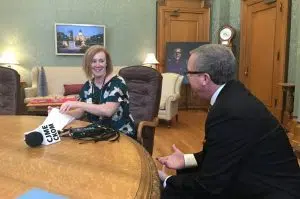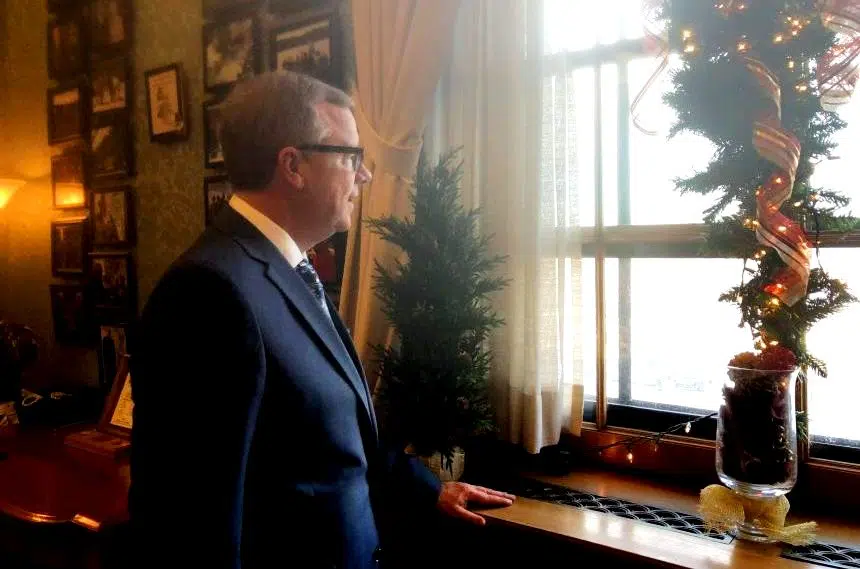It’s with nostalgia and a somewhat bittersweet tone that Brad Wall looks back on 2017.
He shared some of the highs and lows in his last sit down year-end interview as premier with 980 CJME reporter Sarah Mills.
Wall said his biggest personal moment was coming to the decision to retire from politics.
“The last day in the legislature was hard because I love that place. I have been politically nerding out for a very long time and to have a seat in that chamber — that’s the honour of my working life,” Wall said.

Saskatchewan Premier Brad Wall sits down with reporter Sarah Mills for their last year-end interview on Dec. 13, 2017. (980 CJME)
“Even Question Period, which isn’t always that much fun, I will probably miss, not right away though,” he laughed.
While the announcement was made official in late August, Wall and his wife Tami came to the decision near the end of June.
Wall said he wanted to ensure enough time for leadership candidates to campaign and for the race to wrap before the next budget is finalized. The leadership election, which will determine the next premier, is set for Jan. 27.
“I wanted to be mindful of the timeline for the party and the government,” he said. “Overall, I feel good about the decision. It is time for renewal, it’s time for someone else. It will be good for the government and the party.”
Wall’s final budget, delivered in March, was an unpopular one that led to the closure of the Saskatchewan Transportation Company and an increase and expansion of the Provincial Sales Tax.
The Saskatchewan government ended up rolling back a number of decisions made in the budget, including cuts to libraries.
“I’m glad we took the measures that we took. It wasn’t any fun — it was a bit like a Buckley’s mixture budget, where it tastes awful, but I believe in my heart it is going to work. There’s signs of that already,” Wall maintained.
He added that the Royal Bank is forecasting Saskatchewan will lead the country in growth next year and in 2019.
“And we will do it without the massive hangover that other provinces are having because they didn’t decide to make tough decisions and rein in the deficit.”
The premier came to that conclusion because forecasters initially predicted the down turn in non-renewable resource revenues would only last two years. Four years later and there is only now signs of recovery.
“We have to make decisions then that are reflective of that reality and move away from a dependence on resource revenues and that meant PST changes,” he said.
“I don’t know what we could have done other than just say, ‘here’s what we’re going to do, here’s the plan,’ knowing that it is going to be unpopular.”
Through it all, Wall has remained one of the most popular premiers in Canada during this ten-year run.
Following fallout from the budget, those numbers dipped for a short time before ending Wall’s tenure at number one again.
The premier said he’s grateful for that support and, on this particular year, is comfortable that one of his legacies may be the unpopular budget.
“Any government can hindsight things until the cows come home. I guess in the middle of $100 oil we were investing in infrastructure, huge investments. Would we change any of those? Maybe some of them, but not all of them because we had an infrastructure deficit.”
Those decisions, the premier said, are why he believes Saskatchewan weathered the storm of bad revenues relatively well compared to other provinces.







